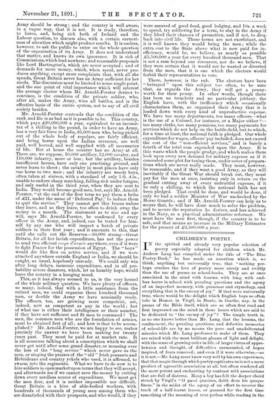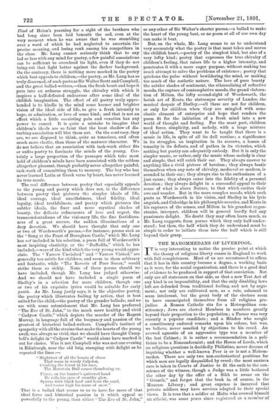CHILDREN'S POETRY.
IN the spirited and already very popular selection of poetry especially adapted for children which Mr. Andrew Lang has compiled under the title of " The Blue Poetry-Book," he has made an assertion which is, we think, anything but universally true, that " nothing per- haps crushes the love of poetry more surely and swiftly than the use of poems as school-books. They are at once associated in the mind with lessons, with long, with end- less hours in school, with puzzling questions and the agony of an imperfect memory, with grammar and etymology, and everything that is the enemy of joy." if that were universally true, where would be the delight which English boys so often take in Homer, in Virgil, in Dante, in Goethe, nay, in the poems of the Bible itself, which are so often first read and first impressed on the mind in those hours which are said to be dedicated to "the enemy of joy " ? The simple truth is, as no one knows better than Mr. Lang, that the lessons, the confinement, the puzzling questions, and defective memories of school-life are by no means the pure and unadulterated miseries which Mr. Lang professes to make of them. They are mixed with the most brilliant gleams of light and delight, with the sense of growing order in life, of larger vistas of appre- hension and thought, of difficulties surmounted, of hopes inspired, of fears removed ; and even if it were otherwise,—as it is not,—Mr. Lang must know very well by his own experience, that that magic through which poetry captivates us is not a mere product of agreeable association at all, but often rendered all the more potent and enchanting by contrast with associations that are full of distress. Many a boy has felt the deeper chord struck by Virgil's " 0 passi graviora, dabit dens his quoque finem," in the midst of the agony of an effort to recover the track of a half-learnt lesson, or guessed for the first time something of the meaning of true pathos while reading in the
Iliad of Helen's yearning for a sight of the brothers who had long since been laid beneath the sod, even at the very moment when he was aware that he was stumbling over a word of which he had neglected to ascertain the precise meaning, and losing rank among his competitors in the class. Mr. Lang cannot seriously think that to any lad or lass with any mind for poetry, a few painful associations can be sufficient to overcloud its light, even if they do not bring out that light better against the darker background.
On the contrary, there is nothing more marked in the poetry which best appeals to children,—the poetry, as Mr. Lang has so truly discerned, of such poets as Sir Walter Scott and Campbell, and the great ballad-writers,—than the fresh heart and hope it puts into an arduous struggle, the chivalry with which it inspires a half-defeated endeavour after some ideal of the childish imagination. The effect of all poetry truly appre- hended is to kindle in the mind some keener and brighter vision of the ideal side of life, to give a fresh intensity to hope, or admiration, or love of some kind ; and that is not an effect which a little coexisting pain and vexation has any power to cancel. It is quite a mistake to imagine that children's ideals are so faint that the least shadow of dis- turbing association will blot them out. On the contrary, they are, we are disposed to think, quite as tenacious, and often much more elastic, than those of the maturer character. We do not believe that an association with task-work either fits or unfits poetry to fascinate the minds of the young. Cer- tainly a large proportion of the passages which take most hold of children's minds have been associated with the seldom altogether pleasant, though probably never altogether painful, task-work of committing them to memory. The boy who has never learned Latin or Greek verse by heart, has never learned its true music.
The real difference between poetry that especially appeals to the young and poetry which does not, is the difference between poetry that pictures the simpler ideals of life, ideal courage, ideal unselfishness, ideal fidelity, ideal loyalty, ideal truthfulness, and poetry which pictures the subtler ideals, the finer and more mystical shades of beauty, the delicate refinements of love and regret, the
transcendentalisms of the visionary life, the fine fastidious- ness of a. great sorrow, the sudden illuminations of a deep devotion. We should have thought that only one or two of Wordsworth's poems,—for instance, poems such as
the " Song at the Feast of Brougham Castle," which Mr. Lang has not included in his selection, a poem full of Wordsworth's most inspiring elasticity, or the " Daffodils," which he has included,—were of the kind which the very young would appre- ciate. The " Yarrow unvisited" and " Yarrow Visited," are generally too subtle for children, and seem to them arbitrary and fantastic, while "The Reverie of Poor Susan," would strike them as sickly. None of these poems should we have included, though Mr. Lang has judged otherwise.
And we should not have included a single poem of Shelley's in a selection for mere children, though one or two of his exquisite lyrics would be suitable for early youth. As Mr. Lang justly says, it is the objective poetry, the poetry which illustrates feeling by action, that is best suited for the child,—the poetry of the grander ballads; and we see with some astonishment that Mr. Lang has preferred "The Eve of St. John," to the much more healthy and vivid " Cadyow Castle," which depicts the murder of the Regent Murray, in language full of the buoyancy and passion of the greatest of historical ballad-writers. Campbell's instinct of sympathy with all the strains that make the hearts of the young swell, was always so vivid, that we should have thought Camp- bell's delight in " Cadyow Castle" would alone have marked it out for choice. Was it not Campbell who was met one evening in Edinburgh, near the old brig, stamping with delight as he repeated the lines :-
"Mightiest of all the beasts of chase
That roam in woody Calydon, Crashing the forest in his race, The Mountain Bull comes thundering on.
Fierce, on the hunter's quivered hand He rolls his eyes of swarthy glow, Spurns with black hoof and horn the sand, And tosses high his mane of snow."
That is a ballad that seems to us to have far more of that ideal force and historical passion in it which appeal so powerfully to the young, than either "The Eve of St. John,"
or any other of Sir Walter's shorter poems,—a ballad to make the heart of the young beat, as no poem at all of our own day can make it beat.
But, on the whole, Mr. Lang seems to us to understand very accurately what the poetry is that most takes and moves the childish heart,—poetry of the simplest kind, but also of a very lofty kind ; poetry that expresses the true chivalry of children's feeling, that raises life to a higher intensity, and penetrates it with a more eager purpose, without making too much attempt to solve the problems of existence ; poetry that quickens the pulse without bewildering the mind, or making too much of the esthetic nature. The love of pure beauty the subtler shades of sentiment, the etherealising of reflective moods, the rapture of contemplative moods, the grand elabora- tion of Milton, the lofty second-sight of Wordsworth, the lavish art of Keats, the statuesque severity of Landor, the musical despair of Shelley,—all these are not for children, or only for children when they are mingled with some elastic element of enterprise and hope that renders the poem fit for the initiation of a fresh mind into a new world of thought and feeling. For the most part, children need force, simplicity, and melody, with a large mixture of ideal action. They want to be taught that there is a music in life, in spite of all its dull routine; a significance in its struggles, an inspiration in its sorrows, a lesson of tenacity in its defeats, and of pathos in its victories, which nothing but poetry can adequately embody. But it is only the simpler music, or rather, only the music whose melody is clear and simple, that will catch their ear. They always answer to anything like a vivid picture of heroism ; they always bestir themselves when any note of chivalry, medieval or modern, is sounded in their ear ; they always rise to the enthusiasm of a just cause ; they always enter into the fidelity of a personal devotion ; they always delight in a successful appeal to their sense of what is above Nature, to that which excites their awe and wonder. But in the more complex moods, which such poets as Wordsworth in his vision, and Shelley in his lyric anguish, and Coleridge in his philosophic reveries, and Keats in his raptures of the senses, and Milton in his grandest organ- strains, interpret, children will in general hardly feel any passionate delight. No doubt they may often learn much, as Mr. Lang suggests, from poems which they only half-under- stand ; but then, the half which they do understand must he simple in order to initiate them into the half which is still beyond their grasp.



















































 Previous page
Previous page